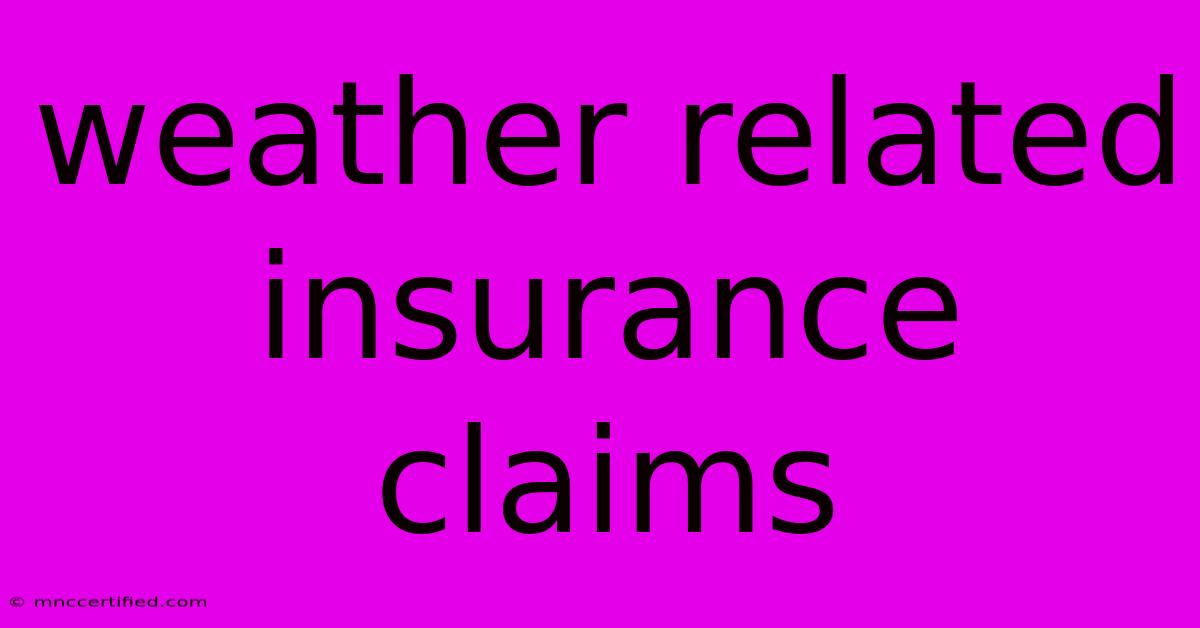Weather Related Insurance Claims

Table of Contents
Weather-Related Insurance Claims: A Comprehensive Guide
Dealing with weather-related damage can be stressful, but understanding your insurance coverage can significantly ease the burden. This comprehensive guide explores everything you need to know about filing weather-related insurance claims, from understanding your policy to maximizing your payout.
Understanding Your Insurance Policy
Before any weather event strikes, carefully review your homeowner's or renter's insurance policy. Key terms to understand include:
- Named perils: These are specific weather events explicitly covered by your policy (e.g., wind, hail, fire, flood). Not all policies cover all weather-related events.
- Peril exclusions: Your policy will likely list events not covered, such as gradual damage from wear and tear or specific types of flooding.
- Deductible: This is the amount you must pay out-of-pocket before your insurance coverage kicks in.
- Coverage limits: Your policy sets limits on how much your insurer will pay for specific types of damage.
Different types of weather events require different types of coverage:
- Wind and Hail Damage: Typically covered under standard homeowner's insurance, but the extent of coverage depends on the severity of the damage and your policy specifics.
- Flood Damage: Flood insurance is separate from standard homeowner's insurance. You'll need a specific flood insurance policy to be covered for flood damage. This is crucial, as many people mistakenly believe their homeowner's insurance covers floods.
- Wildfire Damage: Coverage for wildfire damage varies greatly by location and insurer. Check your policy carefully to understand what is covered and what is not.
- Freezing Pipes: Damage from burst pipes due to freezing temperatures is usually covered, but only if the damage is a direct result of the freezing temperatures and not due to lack of maintenance.
Filing a Weather-Related Insurance Claim: A Step-by-Step Guide
After a weather event, follow these steps to file a claim efficiently:
- Document the Damage: Take photos and videos of all damaged property, both inside and outside your home. Include details such as the date, time, and location of the damage. Detailed documentation is crucial for a smooth claim process.
- Contact Your Insurance Company: Report the damage to your insurance company as soon as possible. Keep a record of the date and time you contacted them, as well as the name of the representative you spoke with.
- Complete the Claim Form: Your insurer will provide you with a claim form. Fill it out accurately and completely, providing all necessary information.
- Cooperate with the Adjuster: An insurance adjuster will be assigned to your claim. They will inspect the damage and determine the extent of the coverage. Be cooperative and provide any requested information promptly.
- Negotiate the Settlement: If you disagree with the adjuster's assessment, negotiate a fair settlement. You may need to provide additional documentation or consult with an independent adjuster.
- Understand Your Rights: Familiarize yourself with your rights as a policyholder. Your state's insurance department can provide additional resources and guidance.
Preventing Future Weather-Related Damage
Proactive measures can minimize the risk of future weather-related damage and associated insurance claims. Consider these steps:
- Regular Home Maintenance: Maintain your property regularly to prevent damage from accumulating. This includes roof inspections, gutter cleaning, and tree trimming.
- Mitigation Measures: Implement preventative measures to minimize potential damage, such as installing storm shutters or reinforcing your roof.
- Emergency Preparedness: Develop a comprehensive emergency plan that includes securing valuables, creating a communication strategy, and arranging for temporary housing if necessary.
Keywords for SEO Optimization:
- weather-related insurance claims
- homeowner's insurance claims weather damage
- filing an insurance claim after a storm
- flood insurance claims
- wind damage insurance claim
- hail damage insurance claim
- wildfire insurance claims
- insurance claim adjuster
- weather damage insurance payout
- how to file a weather insurance claim
By following these steps and understanding your policy, you can navigate the process of filing a weather-related insurance claim effectively and minimize the stress associated with property damage. Remember, thorough documentation and proactive communication are key to a successful claim.

Thank you for visiting our website wich cover about Weather Related Insurance Claims. We hope the information provided has been useful to you. Feel free to contact us if you have any questions or need further assistance. See you next time and dont miss to bookmark.
Featured Posts
-
Insurance Companies Lynchburg Va
Nov 21, 2024
-
Kemper Life Insurance Hammond La
Nov 21, 2024
-
Sustainability Penns Action Plan Focus
Nov 21, 2024
-
Unemployment Insurance In Alaska
Nov 21, 2024
-
Does Insurance Cover A Dui Wreck
Nov 21, 2024